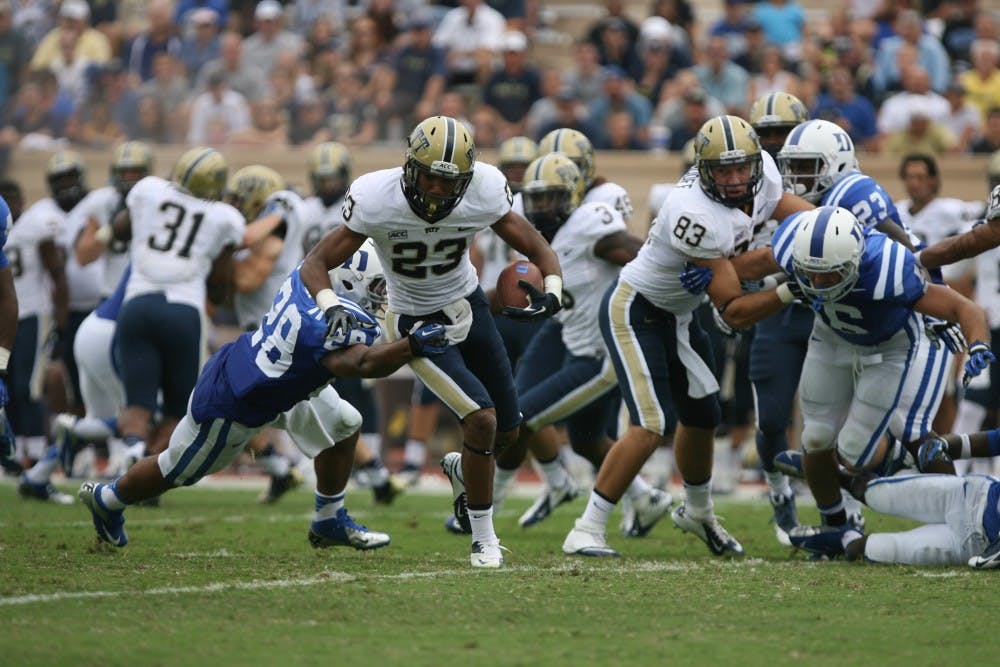For Duke's defense, it was a tale of two halves Saturday afternoon at Wallace Wade Stadium.
"We fought, we battled, and that’s the most
encouraging thing," redshirt senior cornerback Ross Cockrell said.
The Blue Devils' defensive unit had a trying first half against Pittsburgh (2-1, 1-1 in the ACC), allowing 37 points and 468 total yards in the opening 30 minutes. For comparison's sake, Georgia Tech accrued 469 yards and scored 38 points in a blowout victory last week.
The Panthers could have had 41 points in the first half, but Duke (2-2, 0-2) blocked a 24-yard field goal, and Pittsburgh kicker Chris Blewitt missed an extra point. But despite its slow start, the team did not feel that a lack of intensity was the problem.
"We can't work harder," Blue Devil head coach David Cutcliffe said. "That team was about as cranked up as you could
get. They were about to knock the locker room doors down."
With intensity and energy ruled out as culprits for the disastrous first half, the only remaining explanation was that the Panthers simply outplayed Duke, a realization that both the players and coaches came to after the game. One of the biggest problem areas for the Blue Devils was matching up with Pittsburgh's size up front, which allowed true freshman James Conner to rack up 144 rushing yards in the first half.
"It was definitely frustrating," redshirt senior defensive end Kenny Anunike said. "It was just pound the football, and just try to pound it down your throat. I think in the first half, we just came out a little bit slow."
Although the defense was outplayed in the first half, the second half was a completely different story. Duke's defensive unit allowed just 130 yards of total offense and 14 points, with all of the points coming in the third quarter. Pittsburgh's only points in the fourth quarter came via a 37-yard interception return for a touchdown by linebacker Anthony Gonzalez.
The Blue Devil unit that looked outmatched in the first half turned into the aggressors in the second, and helped pull the team within three points in the game's closing minutes.
Cutcliffe was quick to laud the team for their resiliency in coming back in the second half, but argued that the team's physical capabilities were the reason for the turnaround, not effort.
"You saw our defense in the second half," Cutcliffe said. "[We]
stymied them pretty well. There was something there, and we’ll look at it. And
it will be something—not just rah-rah energy. It will be something physical,
something we’re doing better."
Though the defense looked strong in the second half, the first half of action was not an anomaly. The Duke defense has struggled more often than not of late. In the last eight games the Blue Devils have played against FBS opponents—dating back to last season—Duke has allowed more than 550 total yards of offense in five of those contests. Two of the three games in which Duke allowed fewer than 550 yards came against Georgia Tech, who racked up 918 yards in the two contests combined, still a lofty total. The third game was a convincing defensive performance against a hapless Memphis offense that mustered 237 yards.
Duke showed Saturday the best and worst its defense has to offer, but the road ahead could be difficult. Linebacker Kelby Brown and safety Dwayne Norman both left the game against Pittsburgh with injuries, and fellow starting safety Corbin McCarthy did not play. Norman's injury could be problematic, the prognosis for Brown's ankle injury is less clear.
A silver lining for this defensive unit is the play of freshmen defensive backs Breon Borders, Bryon Fields and Deondre Singleton, who all played significant minutes as Duke's defense came to life in the second half.
"They bring a lot of athleticism, a lot of
energy," Cockrell said. "They can make plays, and that’s what we need in the secondary. We need
to force turnovers, and we need to make tackles."
Defense has been a problem for the Blue Devils of late, but an end to the struggles could be on the horizon if Duke can harness the magic they found in the second half of Saturday's contest and put it forward to the remaining eight games of the season.
"If you have players who are going to give up,
who stop giving effort, then you have a problem," Cockrell said. "But as long as everybody is
going to battle and fight and continue to play as hard as they can, then I
think we can do a lot of good things this year."
Get The Chronicle straight to your inbox
Signup for our weekly newsletter. Cancel at any time.

